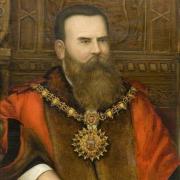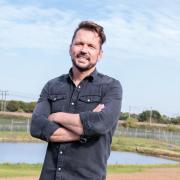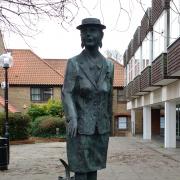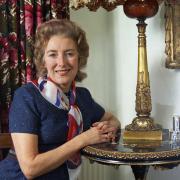Our county’s best food produce is recognised both nationally and internationally, but there is a lot of hard work behind the scenes. Stephanie Mackentyre meets three of our local food heroes who have helped put Essex on the world’s culinary map

Paul Kelly
Kelly’s Turkeys, Danbury
Over the Easter holidays many will turn their thoughts to a family gathering over a traditional roast. And what better way to celebrate than with an award-winning, local Kelly Bronze turkey from the first of our food heroes, Paul Kelly, whose farm is set in woodlands near Danbury.
Kelly’s Turkeys represents three generations of the Kelly family. In 1971, Paul’s father Derek Kelly, having worked in the turkey farming industry for some years, originally began the business selling higher quality white turkeys. He believed in slower and longer maturation, careful selection of feed, traditional dry-plucking and hanging the carcasses to develop flavour. He was convinced that people would pay a premium for a better product.
‘I was eight years old when he began, so I’ve grown up with the turkeys,’ says Paul. Derek purchased most of the remaining flocks of bronze turkeys in the UK, which amounted to less than 300 birds. These he crossbred together for five years, to broaden the genetic base, after which he began to group them into breeding families for different end weights and other characteristics.
By 1984 they were selling 180 Kelly Bronze turkeys and today that figure has risen to 32,000. ‘The turkey market is actually 10,000,000, so we are still actually quite small, but we are leading the premium brand by a long way,’ says Paul.
Paul explains what makes their turkeys so special. ‘It’s not just that we have our own breed. It’s that we grow them to full maturity and then it’s all about the way we pluck and handle them. However, the biggest factor is how long you grow the bird for and how long you hang it for. Yes they are organic and free range, but it’s the other factors which create the immense flavour.
‘Our cooking times are also radically different to a standard turkey; your standard turkey is about 10-12 weeks old, but ours are six months old, which gives the bird time to lay down fat, especially in the last five to six weeks. This conducts the heat, so our birds take only two hours to cook.’
Kelly’s Turkeys were the very first to win three gold stars in the Great Taste awards, with Kelly’s winning Poultry Producer of the Year and Derek and Paul separately winning an award from the British Turkey Federation for, ‘an outstanding contribution and commitment to the turkey industry’ – the only father and son ever to win the award in separate years.
1997 was the start of organically farming this popular Essex-bred bird in Germany. Royal recognition followed in the form of an MBE for Derek and Kelly’s Turkeys were appointed by Prince Charles’ organic food brand, Duchy Originals. In 2014, as they celebrated 30 years as a family business, Kelly’s purchased a farm in the foothills of the Blueridge mountains in Virginia.
‘With woodland and pasture we now rear our unique KellyBronze turkeys for the US market. We dry-pluck, hang and prepare the birds in the same way as we produce KellyBronze here in Danbury,’ adds Paul.
‘In the US there is no premium range out there, so the price point is high for them, but once they try the flavour there’s no contest. In Germany our organic, free range turkeys are really popular. What’s more worrying for us right now is how we will be able to keep the quantity of casual labour once the full force of Brexit has been felt.’
This year Paul has exciting plans to open a new charcuterie from September. ‘It will enable us to offer a cooked range and a deli too, all still based here in Danbury.’
Kelly Turkeys, Springate Farm, Bicknacre Road, Danbury, CM3 4EP
01245 223581

Steve Osbourne
Maldon Salt
Each KellyBronze turkey arrives carefully wrapped and boxed with a complimentary box of Maldon Salt. Our second food hero is Steve Osborne, owner of Maldon Salt.
Maldon Salt is a family¬run business which celebrated its 135th anniversary in 2017, having been in the Osborne family for four generations. The natural sea salt flakes are still harvested using the same traditional methods, first used in 1882. The process starts with natural saltwater, drawn from the coastal areas of Maldon.
Once it’s finished its voyage, washing over the local marshes soaking up minerals, it’s pumped into the Maldon saltworks via a traditional barge. It’s filtered and pumped ashore into steaming, stainless steel pans.
Only four people at Maldon Salt know the art of timing and temperature used to create the pure white, crystal flakes which are loved by chefs here in Essex and indeed all around the world. Maldon’s flakes release their saltiness with sweet precision, and add another layer of texture and crunch.

Today Maldon Salt exports to 60 different countries each and every year. Steve explains: ‘We’re proud to have had such a profound and positive effect on people’s taste buds for so long.’
Maldon Crystal Salt Company Limited, Wycke Hill Business Park, Maldon, CM9 6UZ
01621 853 315
David Smale
English Saffron, Saffron Walden
Even the 135-year history of Maldon Salt is eclipsed by the history of saffron growing in the county of Essex. Saffron was grown in Essex more than 500 years ago and in fact, the cultivation of this particular plant was so important to the region that Saffron Walden was named after it.
The name saffron derives from the Arabic za’faran, meaning ‘yellow’. It comes from the red stigma of the autumn flowering purple crocus sativus. You probably know that saffron is the most expensive spice in the world, more expensive even than gold. Why? Well each flower has to be hand-harvested, removing the three delicate stigmas, before they are carefully dried. For just one gram of dried saffron it takes approximately 200 flowers.
David Smale from English Saffron is our third food hero. David looked to our Essex heritage for inspiration for his business and 15 years ago he decided to begin growing a small number of autumn crocuses, with the intention of harvesting this much sought after crop.
’There are now a few other people growing saffron in England, mainly as a result of the publicity we have had over the years,’ says David. ‘Most of them has asked us for advice and tips.’ David also grows a small amount at their family home in Devon which used to be a carnation nursery. ‘The saffron grows far better here in Essex, as the weather is far too damp in Devon.’
Saffron may be an idealistic nod to the past, but it’s a tough choice for a business venture. ‘Saffron is extremely labour intensive ¬ it is never going to make us rich! We grow it because we love it.’
The reaping of this specialist crop had become a lost art, so David found himself scouring text books from the Middle Ages to research techniques of cultivation, harvesting and drying methods.
Today he works with family members in a thriving business, with a show garden explaining this unique story at Bridge End Gardens in Saffron Walden. He is also kept busy with talks across the UK, and internationally too, sharing the story of this fascinating crop.
‘I’m also still very involved in researching the history of saffron, giving talks and indeed meeting other saffron producers around the world,’ David adds.
Along with his older sister, Penny Attwood, they started to make saffron gin four years ago. ‘It is made in a distillery in Essex from scratch using East Anglian sugar beet and other botanicals,’ says David. The siblings have since further expanded to include a line of saffron chocolates made by an artisan chocolatier in Saffron Walden.
David says his crop is sweeter than the mass produced saffron, which has made his English Saffron popular with chefs including Hugh Fearnley Whittingstall and department stores including Fortnum & Mason.
‘Our saffron is uniquely sweet with a heavy honey perfume and deep golden colour. English Saffron has such an intense flavour and colour because of the wonderful Essex soil and climate. You talk about the terrior, which reflects the flavour of wines from different regions, and it’s the same with saffron grown in different parts of the world. The soil is very rich here and we have comparatively very little rain.’
English Saffron
_________________



























